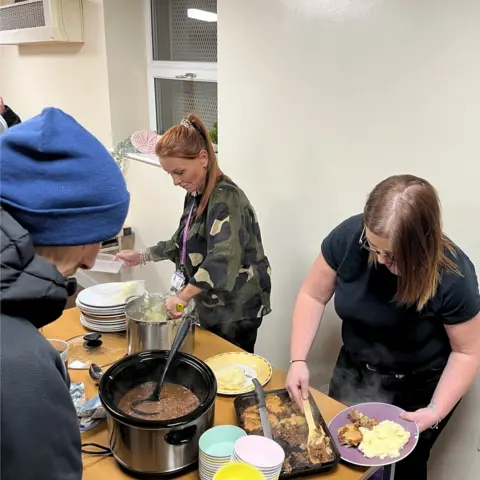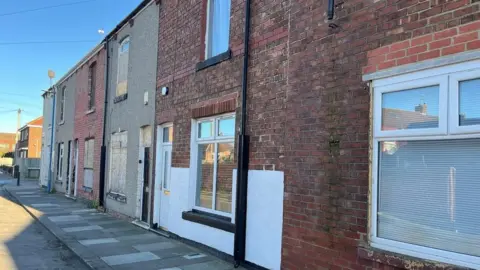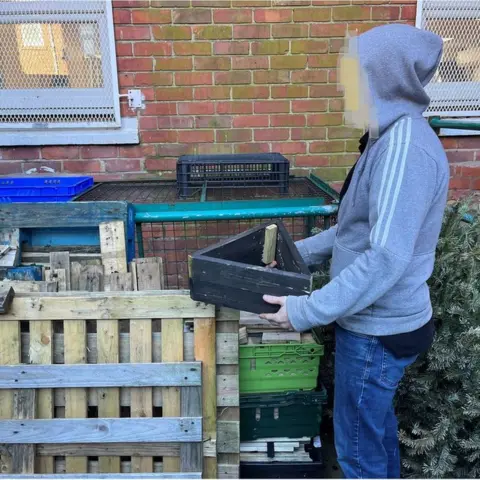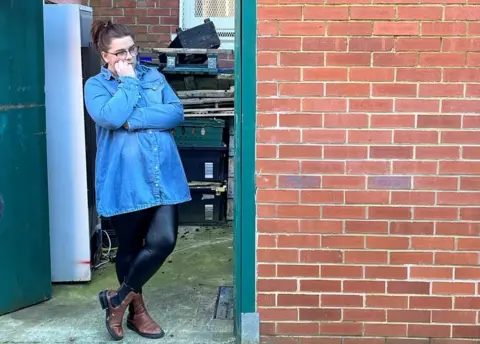The crime hotspot where a community helps ex-offenders go straight
 BBC
BBCThe latest crime figures for England and Wales once again show the policing area of Cleveland, in the North East, has the highest overall crime rate for its population. BBC News speaks to people in one community there about how they are supporting ex-offenders to help them stay out of trouble.
In the Dyke House area of Hartlepool, people fear speaking openly about crime and antisocial behaviour.
"I'd have my windows put in," one man tells BBC News.
"We're frightened at night," a woman a few streets away says.
Her home has security cameras, three padlocks on the back gate and, after moving in just two years ago, she says she now wants to move away from all the verbal abuse, fights, multiple burglaries and even arson.
But despite Dyke House's many problems, community-development worker Caroline Robinson says: "Few areas in Hartlepool have a sense of community like this one. They look after each other."
And she is at the forefront of efforts to support the very people who have contributed to residents' fears, aiming to help ex-offenders stay out of crime.
Using drugs
Sometimes in Dyke House, among the poorest 2% of areas in England, the same people can be both perpetrators and victims.
Jay, not his real name, 42, was earning good money as a welder until his drug use, which began with cannabis, spiralled to crack cocaine.
Now, he has poor mental health, cannot work - despite, he says, no longer using drugs - and has come to a drop-in session at the Annexe community resource centre, for a hot meal and some help, after a fire at his home fused the electricity, leaving him without heat or light on one of the coldest nights of the year.
Jay admits having supplemented his income by stealing and has served time in jail.

These days, he says: "I struggle to feed myself, let alone buy drugs."
Jay has been in his rented property for two years.
"At first it was nice," he says - but about six months ago, thieves smashed the front window and stole his television set.
The window frame, like many others locally, is still boarded up.
Another time, police held Jay for 24 hours after a fight:
"The place was left open and people helped themselves to my stuff," he says.
"The house was trashed, a mess."
'Route out'
On this freezing January night, volunteers hand out gloves and socks to people who are street homeless or, like Jay, have no heating.
Caroline remembers him from secondary school, along with others in the room, but had no inkling then of their futures.
Illegal drugs "are a massive contributor to all crime, everywhere in the country", she says.
"Hartlepool is no different. It's a big issue. It's an illness that many of the people that come into the building suffer with.
"What we're doing here is trying to focus on how we move away from that, support people that are victims of it but also give perpetrators a route out."
'Freezing cold'
David, 37, who like Jay asked not be named, is one of those attempting that route.
He was a skilled joiner, with a home and a family, until an attack put his arms and hands in casts for nine months, destroying his strength and grip and taking his livelihood.
Alcohol and drugs took over, sometimes costing him £100 a day.
And David admits "stealing, lying, shoplifting, just to feed yourself, feed your habit", leading to nine months in jail.
When he was released, David had to live in a tent.
"You're expected to keep your head above water, behave and go to all your appointments, when you can't even sleep at night and you're waking up freezing cold," he says.

Probation brought David to Hartlepool, where he found accommodation and the Annexe gave him "some things to do, people to talk to, a bit of stability".
Now, 18 months later, he volunteers in the kitchen.
The centre bought him some tools and David makes garden planters out of waste wood, giving them away to members of the community.
Not taking drugs anymore makes him feel "top of the world", he says.
And his volunteering means "everything, a new start, a new venture, new prospects".
'Everybody suffers'
Soon, David hopes to find a driving job.
When he was stealing, he thought nothing of it.
Now, he feels remorse, describing his former lifestyle of preying on his neighbours and local businesses as "bad".
"Your neighbours suffer, people suffer, everybody suffers," David says.

Caroline says the experience of many ex-offenders is "almost like a rinse and repeat... in and out of prison, in and out of offending", .
"Absolutely, people who commit crime should go through the judicial system," she says.
"What we do afterwards is we offer an option of forgiveness, redemption and try and give them something else to do.
"Let's break that cycle."
Victims of crime are "incredibly important and we offer them as much support as they would like us to", Caroline says.
"But we're different in the sense that we're now working with perpetrators as well and saying, 'Right, what's going on? Why are we doing this? We don't need to do that anymore,'" she says.
"And we can start again and give people a chance to start again as often as they need it."
'Different way'
Darren Leighton, of the Joseph Rowntree Foundation charity, which works with the Annexe on joint projects, says the aim is to help ex-offenders develop a sense of purpose and a more positive relationship with society.
And the benefits to perpetrators, the victims of crime and wider society "are becoming evident all the time".
"Better all round," Darren says.
"We hope we can show that a different way is possible."
